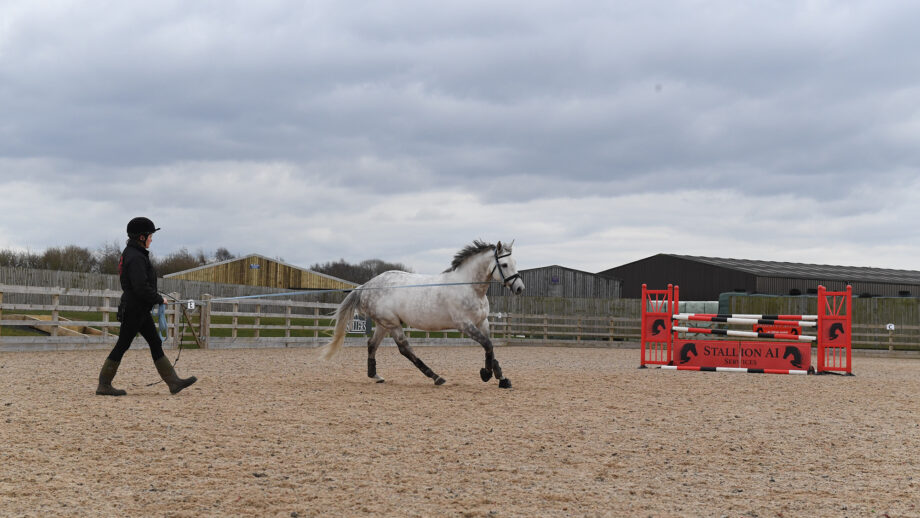The coronavirus pandemic has turned the world on its head. Alice Collins investigates how breeders have fared, and the impact Covid-19 has had on the market
Life as we know it is on hold, at least for now. But when breeders make their decisions, they’re required to look to the following year. So how do they think the pandemic has shifted the landscape and what might come next?
Many in the breeding world have been forced to adapt in this torrid time, exing to new ways of working or selling. One of those is Emma Blundell of Yorkshire-based dressage stud Mount St John. Covid-19 came knocking for Emma, who was laid low by the virus in March and had to postpone many 2020 plans.
“We pivoted to an online auction for the first time,” she says. “Though it was later than we’d planned due to my illness.”
{"content":"PHA+V2l0aCB0aGUgb25zZXQgb2YgdGhlIHBhbmRlbWljIGFuZCB0aGUgZW5zdWluZyBsb2NrZG93biwgRW1tYeKAmXMgY2xpZW50cyBjb3VsZCBubyBsb25nZXIgdHJhdmVsIHRvIHRoZSBzdHVkIHRvIHZpZXcgaG9yc2VzLjwvcD4KPHA+4oCcV2XigJlkIHRob3VnaHQgYWJvdXQgYW4gb25saW5lIHNhbGUgYmVmb3JlLCBidXQgQ292aWQgd2FzIHRoZSBmaW5hbCBudWRnZSzigJ0gc2F5cyBFbW1hLCB3aG8gaGFzIHNvbGQgYSB0b3RhbCBvZiAxMCBlbWJyeW9zIHRoaXMgeWVhci4g4oCcV2UgaGFkIHRvIGFkanVzdCBmYXN0IGFuZCBjcmVhdGUgYSBsb3QgbW9yZSB2aWRlbyBhbmQgcGljdHVyZXMgb2YgYWxsIHRoZSBob3JzZXMgZm9yIHNhbGUuPC9wPgo8cD48ZGl2IGNsYXNzPSJhZC1jb250YWluZXIgYWQtY29udGFpbmVyLS1tb2JpbGUiPjxkaXYgaWQ9InBvc3QtaW5saW5lLTIiIGNsYXNzPSJpcGMtYWR2ZXJ0Ij48L2Rpdj48L2Rpdj48c2VjdGlvbiBpZD0iZW1iZWRfY29kZS0zMSIgY2xhc3M9ImhpZGRlbi1tZCBoaWRkZW4tbGcgcy1jb250YWluZXIgc3RpY2t5LWFuY2hvciBoaWRlLXdpZGdldC10aXRsZSB3aWRnZXRfZW1iZWRfY29kZSBwcmVtaXVtX2lubGluZV8yIj48c2VjdGlvbiBjbGFzcz0icy1jb250YWluZXIgbGlzdGluZy0tc2luZ2xlIGxpc3RpbmctLXNpbmdsZS1zaGFyZXRocm91Z2ggaW1hZ2UtYXNwZWN0LWxhbmRzY2FwZSBkZWZhdWx0IHNoYXJldGhyb3VnaC1hZCBzaGFyZXRocm91Z2gtYWQtaGlkZGVuIj4NCiAgPGRpdiBjbGFzcz0icy1jb250YWluZXJfX2lubmVyIj4NCiAgICA8dWw+DQogICAgICA8bGkgaWQ9Im5hdGl2ZS1jb250ZW50LW1vYmlsZSIgY2xhc3M9Imxpc3RpbmctaXRlbSI+DQogICAgICA8L2xpPg0KICAgIDwvdWw+DQogIDwvZGl2Pg0KPC9zZWN0aW9uPjwvc2VjdGlvbj48L3A+CjxwPuKAnEx1Y2tpbHksIGFzIGEgY29tbWVyY2lhbCBvcGVyYXRpb24sIHdlIGNvdWxkIGNvbnRpbnVlIHNhZmVseSBzY2FubmluZyBhbmQgYnJlZWRpbmcgYXMgbm9ybWFsIGR1cmluZyBsb2NrZG93biwgd2hlcmVhcyBzb21lIHBlb3BsZSBjdXQgYmFjayBvciBtYXliZSB2ZXRzIGNvdWxkbuKAmXQgY29tZSBvdXQuIFRoYXTigJlzIHdoeSB3ZSBkZWNpZGVkIHRvIHB1dCBtb3JlIGluLWZvYWwgbWFyZXMgaW50byB0aGUgYXVjdGlvbiB0aGFuIHdl4oCZZCBub3JtYWxseSBzZWxsLuKAnTwvcD4KPHA+T2YgdGhlIDEzIGxvdHMsIHRoZSBwcmljZSBoaWdobGlnaHQgb2Yg4oKsMjQsMDAwICjCozIxLDMwMCkgd2FzIGFuIGVtYnJ5byBmcm9tIFV1c21pbmthLCB0aGUgZnVsbCBzaXN0ZXIgb2YgVG90aWxhcywgYnkgRm91bmRhdGlvbi4gTmF0aW9uYWwgZ3JhbmQgcHJpeCBjaGFtcGlvbiBNb3VudCBTdCBKb2huIEZyZWVzdHlsZeKAmXMgZGF1Z2h0ZXIgTVNKIERhbmNlIG9vciBwcm92aWRlZCBhbiBlbWJyeW8gYnkgVG90aWxhcywgd2hpY2ggc29sZCBmb3Ig4oKsMjMsMDAwLiBUaGUgYXZlcmFnZSBwcmljZSBvZiB0aGUgc2V2ZW4gYXVjdGlvbiBlbWJyeW9zIHdhcyDigqwxOCw5MjcuPC9wPgo8cD5PdGhlciBvbmxpbmUgYXVjdGlvbnMgYWxzbyB5aWVsZGVkIHJvYnVzdCBtb25leSwgd2l0aCB0aGUgQmlsbHkgU3R1ZOKAmXMgZWxpdGUgMjAyMCBzYWxlIGxlYWRpbmcgdG8gc2l4IHJpZGRlbiBqdW1wZXJzIGFuZCBldmVudGVycyBzZWxsaW5nIGZvciDCozUwLDAwMCBvciBtb3JlLjwvcD4KPGRpdiBjbGFzcz0iYWQtY29udGFpbmVyIGFkLWNvbnRhaW5lci0tbW9iaWxlIj48ZGl2IGlkPSJwb3N0LWlubGluZS0zIiBjbGFzcz0iaXBjLWFkdmVydCI+PC9kaXY+PC9kaXY+CjxwPlRoZSBhbm51YWwgRGVjZW1iZXIgU2Nob2NrZW1vzIhobGUvS2Fzc2VsbWFubiBQU0kgQXVjdGlvbiBvZiBkcmVzc2FnZSBhbmQganVtcGluZyBob3JzZXMgdG9vayBwbGFjZSB3aXRob3V0IGFuIGF1ZGllbmNlIGZvciB0aGUgZmlyc3QgdGltZSBpbiBpdHMgNDEteWVhciBoaXN0b3J5LCBidXQgc3RpbGwgcHJvZHVjZWQgYSB0dXJub3ZlciBvZiDigqwxNC41bS4gVG9wIG9mIHRoZSA0MiBsb3RzLCB0aGUgc2l4LXllYXItb2xkIGp1bXBlciBDYWxvdXJpbmEgUFMg4oCTIGJ5IENhcmVtYmFyIERlIE11emUg4oCTIHNvbGQgZm9yIOKCrDEuNm0uPC9wPgo8cD5PdGhlciBmcmVzaCBvbmxpbmUgdGFjdGljcyByZWFwZWQgZGl2aWRlbmRzLCBub3QgbGVhc3QgZm9yIFR1bGxpcyBNYXRzb24gb2YgU3RhbGxpb24gQUkgU2VydmljZXMsIHdobyBiZWdhbiBvZmZlcmluZyB3ZWJpbmFycy48L3A+CjxkaXYgY2xhc3M9ImFkLWNvbnRhaW5lciBhZC1jb250YWluZXItLW1vYmlsZSI+PGRpdiBpZD0icG9zdC1pbmxpbmUtNCIgY2xhc3M9ImlwYy1hZHZlcnQiPjwvZGl2PjwvZGl2Pgo8cD5UaGVpciBwb3B1bGFyaXR5IOKAkyBzcGFubmluZyBtb3JlIHRoYW4gNzAgY291bnRyaWVzIOKAkyBzdXJwcmlzZWQgaGltLjwvcD4KPHA+4oCcTGlrZSBldmVyeW9uZSwgd2XigJl2ZSBoYWQgdG8gbW9kaWZ5IGhvdyB3ZSByZWFjaCBvdXQgdG8gY2xpZW50cywgc28gd2UgZGVjaWRlZCB0byB0cnkgd2ViaW5hcnMs4oCdIHNheXMgVHVsbGlzLiDigJxOb2JvZHkgZXZlbiBrbmV3IHdoYXQgWm9vbSB3YXMgYmFjayB0aGVuLiBUaGUgd2ViaW5hcnMgYWJzb2x1dGVseSBmbGV3IGFuZCBCcml0aXNoIEJyZWVkaW5nIHdhbnRlZCB0byBiZSBpbnZvbHZlZCB0b28sIHNvIHdlIGpvaW5lZCBmb3JjZXMu4oCdPC9wPgo8ZGl2IGNsYXNzPSJhZC1jb250YWluZXIgYWQtY29udGFpbmVyLS1tb2JpbGUiPjxkaXYgaWQ9InBvc3QtaW5saW5lLTUiIGNsYXNzPSJpcGMtYWR2ZXJ0Ij48L2Rpdj48L2Rpdj4KPHA+VGhlcmUgd2FzIGFsc28gYW4gdXB0aWNrIGluIHN0YWxsaW9ucyBjb21pbmcgdG8gU3RhbGxpb24gQUkgaW4gMjAyMCwgYW5kIHRoZSAyOCBzdGFsbGlvbiBib3hlcyB3ZXJlIGZ1bGwgZnJvbSB0aGUgZmlyc3QgbG9ja2Rvd24uPC9wPgo8cD7igJxCcmVlZGVycyBoYWQgYSBsb3QgbW9yZSBjaG9pY2UsIGFzIHN0YWxsaW9ucyB3aG8gbm9ybWFsbHkgY29tcGV0ZSB3ZXJlbuKAmXQgYXQgc2hvd3MgYW5kIHdlcmUgYXZhaWxhYmxlIGZvciBicmVlZGluZyzigJ0gYWRkcyBUdWxsaXMuIOKAnFdlIGFsc28gZnJvemUgbW9yZTsgdXN1YWxseSBpbiB0aGUgc3VtbWVyIGl04oCZcyBqdXN0IGZyZXNoIGFuZCBjaGlsbGVkLCBidXQgbG90cyBvZiBzdGFsbGlvbnMgY2FtZSBmb3IgZnJlZXppbmcgaW4gMjAyMC7igJ08L3A+CjxwPkxpa2UgVHVsbGlzLCBTaGlybGV5IExpZ2h0IG9mIEJyZW5kb24gU3R1ZCBmb3VuZCB0aGF0IGJyZWVkZXJzIHdlcmUgZWFnZXIgdG8gdXNlIHRoZSBzdGFsbGlvbnMgdGhleSB3ZXJlIG9mZmVyaW5nLjwvcD4KPHA+4oCcV2UgaGFkIGEgcmVhbGx5IGdvb2Qgc2Vhc29uLOKAnSBzaGUgc2F5cy4g4oCcQSBsb3Qgb2YgcGVvcGxlIHdob+KAmWQgYmVlbiBkaXRoZXJpbmcgYWJvdXQgd2hldGhlciB0byBicmVlZCBwdXQgdGhlaXIgaG9yc2VzIGluIGZvYWwsIGFzIHRoZXkgcmVhbGlzZWQgdGhlIHN1bW1lciB3YXMgYSB3aXBlb3V0LuKAnTwvcD4KPHA+U2hpcmxleSBoYXMgc2VlbiBwcmljZSB0YWdzIGF0IHRoZSB0b3AgZW5kIG9mIHRoZSBtYXJrZXQgaG9sZGluZyB1cCB3ZWxsLjwvcD4KPHA+4oCcUHJpY2VzIGhhdmUgZ29uZSB1cCBmb3IgZ29vZCBvbmVzIGFzIHRoZXJlIGFyZSBmZXdlciBob3JzZXMgYWJvdXQsIGJ1dCB0aGF04oCZcyBiZWVuIGJyZXdpbmcgZm9yIGEgZmV3IHllYXJzIGFzIHByaWNlcyBmb3IgZXZlcnl0aGluZyBrZWVwIGdvaW5nIHVwLOKAnSBzaGUgYWRkcy4g4oCcUXVhbGl0eSBob3JzZXMgYXJlIGhvbGRpbmcgb24gdG8gbW9yZSB2YWx1ZSwgZXNwZWNpYWxseSBob21lLWJyZWRzLuKAnTwvcD4KPHA+TG9ybmEgV2lsc29uIG9mIEVsaXRlIFN0YWxsaW9ucyBhbmQgTmV3dG9uIFN0dWQgaGFzIGhhZCBtb3JlIGJ1eWVycyBpbnRlcmVzdGVkIGluIHB1cmNoYXNpbmcgZW1icnlvcyBmcm9tIHN0cm9uZyBkYW0tbGluZXMuPC9wPgo8cD7igJxUb3AgbWFyZSBsaW5lcyB3aWxsIGFsd2F5cyBzZWxsLCBzbyB3ZSBsb29rZWQgYXQgbmV3IHdheXMgb2YgZ2V0dGluZyBwZW9wbGUgaW50byBxdWFsaXR5IGJsb29kbGluZXMgd2l0aG91dCBoYXZpbmcgdG8gc3BlbmQgc2l4LWZpZ3VyZSBzdW1zIG9uIHRvcCBtYXJlcy4gRWxpdGUgRW1icnlvcyB3YXMgaW4gdGhlIHBpcGVsaW5lIGFueXdheSwgYnV0IHdlIHNwZWQgaXQgdXAgYXMgd2UgaGFkIHNvIG1hbnkgZW5xdWlyaWVzLuKAnTwvcD4KPHA+VGhlIGluY3JlYXNpbmdseSBhY3RpdmUgb25saW5lIG1hcmtldCBwdXRzIHNlbGxlcnMgd2l0aCBnb29kLCB0cmFuc3BhcmVudCByZXB1dGF0aW9ucyBhdCBhIG1ham9yIGFkdmFudGFnZS48L3A+CjxwPkJyZW5kb24gU3R1ZCBhbmQgTW91bnQgU3QgSm9obiBib3RoIGhhdmUgY2xpZW50cyB3aG\/igJl2ZSBiZWVuIGNvbiBkZW50IHRvIGJ1eSBvbiByZWNvbW1lbmRhdGlvbiwgd2l0aG91dCBzZWVpbmcgdGhlIGhvcnNlcyBpbiBwZXJzb24uIEluIDIwMjAsIEVtbWEgc29sZCBhIGZvYWwgZm9yIHRoZSBoaWdoZXN0IHByaWNlIHNoZeKAmXMgZXZlciBhY2hpZXZlZC4gU2hlIGFsc28gZGlwcGVkIGhlciB0b2UgaW50byBvbmxpbmUgYnV5aW5nLjwvcD4KPHA+4oCcSSBib3VnaHQgbXkgZmlyc3QgaG9yc2Ugb25saW5lIGR1cmluZyBDb3ZpZCDigJMgYW4gZW1icnlvIGF0IGF1Y3Rpb24s4oCdIHNoZSBzYXlzLiDigJxGb3IgYSBsb2NrZG93biBNb25kYXkgbmlnaHQsIGl0IHdhcyBwcmV0dHkgZXhjaXRpbmcuIEkgdGhpbmsgdGhlIG9ubGluZSBtYXJrZXRwbGFjZSB3aWxsIGdyb3cgYSBsb3QsIHBhcnRpY3VsYXJseSBmb3IgZW1icnlvcy7igJ08L3A+CjxwPlNoaXJsZXnigJlzIHJlcHV0YXRpb24gZm9yIGhvbmVzdHkgaGFzIGFsc28gYmVlbiBhIG1ham9yIGJvb24gaW4gdGhpcyBuZXcgcGFyYWRpZ20uPC9wPgo8cD7igJxJIHNvbGQgZm91ciBob3JzZXMgYWJyb2FkIOKAkyB0byB0aGUgQmFoYW1hcywgRnJhbmNlIGFuZCBJcmVsYW5kIOKAkyBmcm9tIHZpZGVvcyBpbiB0aGUgZmlyc3QgbG9ja2Rvd24s4oCdIHNoZSBzYXlzLiDigJxUaGUgSXJlbGFuZCBsYWR5IHdhcyBzaG9ja2VkIHRoYXQgdGhlIG1hcmUgd2FzIHByZWNpc2VseSBhcyBJ4oCZZCBkZXNjcmliZWQuIFdl4oCZdmUgYnJlZCBhbmQgcHJvZHVjZWQgdGhlc2UgaG9yc2VzLCBzbyB3ZSBrbm93IHRoZW0gaW5zaWRlIG91dC4gQW5kIGl0IGhlbHBzIHRoYXQgSeKAmW0gZmFpcmx5IHdlbGwga25vd24gZm9yIHRlbGxpbmcgaXQgbGlrZSBpdCBpcy4gVHJhbnNwYXJlbmN5IGlzIGtleSBpbiBldmVyeSBhc3BlY3QgYW5kIGJ1eWVycyBhcmVu4oCZdCBnb2luZyB0byBnZXQgYW55IHN1cnByaXNlcy7igJ08L3A+CjxwPlNhbGVzIG9mIHNlbWVuIGZyb20gdGhlIGh1bmRyZWRzIG9mIEV1cm9wZWFuIHN0YWxsaW9ucyB0aGF0IExvcm5hIG1hcmtldHMgd2VyZSB1cCB5ZWFyIG9uIHllYXIuPC9wPgo8cD7igJxBIGxvdCBvZiBwZW9wbGUgd2hv4oCZZCBkZWJhdGVkIGJyZWVkaW5nIGZyb20gc3BvcnQgbWFyZXMgZGVjaWRlZCB0byBnbyBhaGVhZCB3aXRoIGl0IHRoaXMgeWVhcizigJ0gc2hlIHNheXMuIOKAnFNvIHdlIGhhZCBtb3JlIHNlbWVuIHNhbGVzLCBhbmQgbW9yZSBzcG9ydCBtYXJlcyBjb21pbmcgdG8gdGhlIHN0dWQgZm9yIGVtYnJ5byB0cmFuc2Zlci4gV2UgZm9hbGVkIDg1IG1hcmVzIGF0IHRoZSBzdHVkIGFuZCBoYWQgdG9ucyBvZiBpbnRlcmVzdCBmcm9tIGJ1eWVycyB2aWEgb3VyIFlvdVR1YmUgY2hhbm5lbC4gVGhlIGJpZyBzdGFsbGlvbiBzdGF0aW9ucyB3ZSB3b3JrIHdpdGggaGF2ZSBhbHNvIGhhZCBhIHN0cm9uZyB5ZWFyOiB0aGUgc3RhbGxpb25zIGF0IEhlbGdzdHJhbmQgY292ZXJlZCA2LDAwMCBtYXJlcywgYW5kIFNjaG9ja2Vtb8yIaGxlIGhhZCB0aGVpciBidXNpZXN0IHllYXIgZXZlci7igJ08L3A+CjxwPlNoaXJsZXkgb2JzZXJ2ZXMgdGhhdCB0aGVyZSBoYXZlIGJlZW4gZmV3ZXIgb3V0bGV0cyBmb3IgdGhvc2Ugd2l0aCBkaXNwb3NhYmxlIGluY29tZXMsIGtlZXBpbmcgdGhlIG1hcmtldCBidW95YW50LjwvcD4KPHA+4oCcVGhlIHRyYWRlIGZvciB5b3VuZyBob3JzZXMgaGFzIGJlZW4gdmVyeSBnb29kLOKAnSBzaGUgY29uZmlybXMuIOKAnFBlb3BsZSB3ZXJlbuKAmXQgZ29pbmcgb3V0IHRvIGVhdCBvciBnb2luZyBvbiBob2xpZGF5LCBzbyB0aGV5IGJvdWdodCBob3JzZXMgaW5zdGVhZC4gQW5kIHRoZXkgaGFkIG1vcmUgdGltZSwgc28geW91bmcgb25lcyB3ZXJlIGluIGRlbWFuZC7igJ08L3A+CjxwPkJ1dCwgYXQgdGhlIG90aGVyIGVuZCBvZiB0aGUgc3BlY3RydW0sIHRoZXJlIGhhcyBiZWVuIHRyZW1lbmRvdXMgbmFuY2lhbCBoYXJkc2hpcC4gTWFueSBob2JieSBicmVlZGVycyBoYXZlIGxvc3Qgam9icyBhbmQgaW5jb21lLCBhbmQgc29tZSBzbWFsbGVyIGJyZWVkZXJzIHNpbXBseSBmb3VuZCB0aGV5IGNvdWxkIG5vIGxvbmdlciBtYWtlIGVuZHMgbWVldCwgc28gYnJlZCBsZXNzLjwvcD4KPHA+V2l0aCBzbyBtdWNoIGVjb25vbWljIHVuY2VydGFpbnR5LCBUdWxsaXMgd2FzIHRha2VuIGFiYWNrIGJ5IHRoZSBpbmNyZWFzZWQgZGVtYW5kLiBBbmQgaGF2aW5nIGJyYWNlZCBmb3IgYSBkcnkgMjAyMCwgTG9ybmEgd2FzIGFsc28gcGxlYXNhbnRseSBzdXJwcmlzZWQgYnkgYnJpc2sgYnVzaW5lc3MgYXQgRWxpdGUgRHJlc3NhZ2UsIHRoZSBzaXN0ZXIgYnVzaW5lc3MgcnVuIGJ5IEFubmEgUm9zcyB0aGF0IHByb2R1Y2VzIGFuZCBzZWxscyBzdG9jayBmcm9tIHRoZSBzdHVkLjwvcD4KPHA+4oCcQXMgc29vbiBhcyB0aGUgcnN0IGxvY2tkb3duIHdhcyBvdmVyLCBBbm5h4oCZcyBwaG9uZSB3YXMgcmluZ2luZyBvIHRoZSBob29rIHdpdGggcGVvcGxlIHdhbnRpbmcgdG8gYnV5IGhvcnNlcyBhdCBhbGwgbGV2ZWxzLOKAnSBzYXlzIExvcm5hLiDigJxBbmRyZWFzIFtIZWxnc3RyYW5kXSBzYWlkIHRoZSBzYW1lOiBub2JvZHkgd2VudCB0byB0cnkgYW5kIGJ1eSBob3JzZXMgaW4gdGhlIGZpcnN0IGhhbGYgb2YgMjAyMCwgYnV0IHRoZXkgbWFkZSB1cCBmb3IgaXQgaW4gdGhlIHNlY29uZCBoYWxmIHdpdGggdHJlbWVuZG91cyBkZW1hbmQu4oCdPC9wPgo8aDM+VGhlIGNvbmZ1c2luZyByb2FkIGFoZWFkPC9oMz4KPHA+VGhlIGZ1dHVyZSBpcyBwYXZlZCB3aXRoIHRoZSBkdWFsIHVuY2VydGFpbnRpZXMgb2YgdGhlIG9uZ29pbmcgZ2xvYmFsIHBhbmRlbWljIGFuZCBCcmV4aXQuIFR1bGxpcyBoYXMgYmVlbiBmZXZlcmlzaGx5IHRyeWluZyB0byBkaWdlc3QgYWxsIHRoZSBuZXcgcG9zdC1CcmV4aXQgcmVndWxhdGlvbnMuPC9wPgo8ZGl2IGNsYXNzPSJpbmplY3Rpb24iPjwvZGl2Pgo8cD7igJxJbml0aWFsbHkgSSB0aGluayBzZW1lbiBpbXBvcnRzIGFuZCBleHBvcnRzIHdpbGwgYmUgYSBuaWdodG1hcmUgYW5kIGV2ZXJ5b25lIHdpbGwgYmUgY29uZnVzZWQsIHNvIHRob3NlIGNvdWxkIHRha2UgYSBiYXR0ZXJpbmcs4oCdIGhlIHNheXMuIOKAnFRoZXJlIGNvdWxkIHdlbGwgYmUgYW4gdXB0aWNrIGluIG1hcmUgb3duZXJzIHVzaW5nIEJyaXRpc2gtYmFzZWQgc3RhbGxpb25zIHdoaWxlIHRoZSBraW5rcyBhcmUgaXJvbmVkIG91dC48L3A+CjxwPuKAnEFueW9uZSB1c2luZyBhIHN0YWxsaW9uIGJhc2VkIGFicm9hZCBzaG91bGQgY29uc2lkZXIgd2hldGhlciB1c2luZyBmcm96ZW4gc2VtZW4gd291bGQgYmUgcG9zc2libGUg4oCTIGZvciB0aGUgbWFyZSBhbmQgdGhlIHZldCDigJMgaW5zdGVhZCwgaWYgdGhlcmUgYXJlIGlzc3VlcyB3aXRoIGNoaWxsZWQs4oCdIGhlIGNvbmNsdWRlcy48L3A+CjxwPjxlbT5SZWY6IDE4IEZlYnJ1YXJ5IDIwMjE8L2VtPjwvcD4KPHA+Cg=="}
You might also be interested in…




